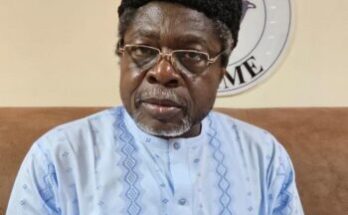By Salisu Na’inna Dambatta
In one of their private discussions as members of the National Reconciliation Committee (NARECOM) to which I was press officer, Chief Audu Ogbeh told some of his colleagues, namely, Alhaji Asheikh Jarma, Alhaji Bilyaminu Usman, Alhaji Abubakar Abubakar Barde and a member from Ebonyi State that for him, the nationwide consultative tour undertaken by the committee to gather and analyse grievances and propose solutions to the grievances was “an intensive political education about Nigeria.”
NARECOM was established by the General Sani Abacha administration as a platform for Nigerians to express their grievances on the annulment of the June 12, 1993 Presidential election. It functioned between February 1996 and July 1998.
Nearly twenty years after making that statement, Ogbeh is into another intensive national, probably more critical assignment which involves information-gathering, analyzing and the articulation of actionable proposals that could finally make it possible for Nigeria to ride on the back of agriculture to diversify its economy and wean it from dependence on a single main foreign currency earner.
As Minister of Agriculture and Rural Development his assignment as gleaned from several phrases and sentences in some of the key speeches of President Muhammadu Buhari and amplified in the 2016 budget speech, goes beyond consolidating and sustaining our self-sufficiency in the production of our main staples.
The assignment requires imaginative reforms in the sector. It is more than erasing the unnecessary importation of rice dressed in chemicals, low-quality wheat, adulterated cooking oil, rotten poultry and expired dairy products.
Ogbeh’s current mandate centres more on reverting agriculture to its preeminent position as the single largest generator of hard currency for Nigeria as it was for 45 years of the 60 years Nigeria was under direct colonial rule, and form 1960 up to mid-1970s.
This is not to suggest that Nigerian agriculture has declined as generally assumed, or that it is performing poorly.
The reality is far from that. Many indicators such as Nigeria being the world’s superpower in cassava production, estimated at 37 million metric tonnes per annum; unassailable position of consistently being world’s second largest producer of food sorghum as well as being the number three largest producer of millet in the world after India and China, show that the sector is not the laggard some people think.
As the largest producer of cow pea in the world and a strong leader in groundnut production, for instance, Nigeria does not need to revive the Groundnuts Pyramids of Kano, Gusau and Kaura Namoda or export the commodity abroad, to prove that our farmers now produce more groundnuts than they did during its production as an export commodity between 1932 and 1973. The truth is that all the groundnuts produced in Nigeria are consumed at home.
The National Bureau for Statistics (NBS) has consistently reported that the sector is the largest single contributor to the country’s Gross Domestic Production of goods and services (GDP), contributing more than twice the percentage oil.
Besides being the single largest employer of labour, agricultural sector is the number two earner of foreign exchange for Nigeria through the export of various agricultural produce including sesame seeds, cassava chips, Cocoa beans, hyde and skin (leather), gum arabic, some fruits, shea nuts and butter, and informally, basic stables such as yams, cashew nuts, sweet potatoes, fresh fruits, millet and sorghum to some neighbouring countries.
The big jinx in the sector is in commoditizing additional agricultural produce and exporting them to markets all over the world. One of the issues Ogbeh may consider intensely is the identification of those exportable produce, their relevant markets, required value addition to attract near-premium prices and the sustainability of supply at the agreed quality standard to the foreign buyers.
For instance, after exporting cassava chips worth over US$118 million to China a few years ago with a promise to deliver more, there appears to be a loud silence on that front. Is that market dry? It can be explored, revived. While in office, President Olusegun Obasanjo found a potential market for Nigerian cassava in Russia, which may now need a follow-up or revival.
The progressing construction of Cargo Terminals at selected airports in Nigeria for the exportation of perishable commodities is important, but identifying and training the farmers who would produce the commodities and setting up the farms and plantations for the production of the perishable goods, are some of the tasks that the minister, an experienced large-scale farmer, should pursue.
The most viable manufacturing or value-adding sector in Nigeria today is agro-allied, comprising large-scale, medium, small and micro food-processors. They engaged thousands of people to mill rice, squeeze oil out of nuts, convert fruit into soft drinks, use sorghum to produce beverages and biscuits, crush maize into flour and deliver dressed chicken, dairy products and fresh eggs to supermarkets and our pots for our daily consumption.
The capacity of the agriculture sector to absorb a large number of those willing to make their living from our fertile land is legendary. The plan by the Buhari administration to engage about 450,000 youths in various aspects of agriculture is good and needs to be pursed vigorously. The market for food in Nigeria is a growth area and it is expanding as the population grows.
There is much faith in the ability of Chief Ogbeh and the Minister of State for Agriculture and Rural Development and the team of agriculturists working with them to sustain our self-sufficiency in various staples on one hand, and mobilise the farmers to grow exportable produce on the other, in sufficient quantities so that the Perishable Cargo Terminals can in practice be the gateway for earning more foreign exchange for Nigeria.
Dambatta is a Federal Director of Information



